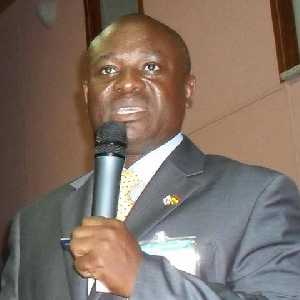Mr Paul Ansah, the Director-General of the Ghana Ports and Harbours Authority, said the port would work towards data integrity and warned that shippers caught filing fictitious documents would suffer stiffer sanctions.
He said it had deployed modern technology such as drones, ship identification system, optical recognition and CCTv cameras to monitor port operations and enhance security.
He said in addition, it had registered and taken biometric details of individuals undertaking business at the port in order to weed out undesired elements from the port enclave.
“We have introduced enhanced container scanners in the examination of goods as well as ensuring good governance system,” he said.
Mr Ansah said this when he made a presentation on GPHA’s perspective on port efficiency at the Port Efficiency Conference held in Accra.
The event was held on the theme: “Improving Port Efficiency and Trade Facilitation in Ghana”.
The conference brought together experts in marine operations worldwide including Dubai, Singapore and Antwerp as well as key stakeholders from the Ghana Ports and Harbours Authority (GPHA), Customs Division of the Ghana Revenue Authority, Freight Forwarders and importers and exporters.
The stakeholders would deliberate on bureaucratic bottlenecks hindering port operations and suggest ideas and measures to deal with the canker in order to improve efficiency at the ports and increase government revenues.
Mr Ansah said cargo handling was the basic duty of a seaport that involved intermodal handling of cargo between sea and other modes of transport.
He said the cost, speed and safety of transfer of goods and services across the various transport modes define the performance of an efficient seaport.
“The port facilitates the availability of the right products, the right quantity, the right condition, the right place, the right customer and the right price that benefit the economy of the country as a whole,” he stated.
He said a port was efficient if it handled merchandise to the satisfaction of its customers in a cost effective manner and enhanced the competitiveness of the country’s export commodities.
To enhance the efficiency of the ports, Mr. Ansah said the management of the port over the past five years invested heavily in infrastructure development and modernised the equipment for handling vessels.
According to him, in the opinion of the economic operations of an efficient port, it minimises the movement of goods and services.
“Each day of the delay in the shipping time increases the cost of the manufactured goods by 0.8 per cent and 10 per cent reduction in the cost of importing and exporting with increased import and export by five percent,” he stated.
He said 60 per cent of the cargo that passed through the port were containalised, saying the port MPS container terminal had been adjudged by Management Association of West and Central Africa as the best managed container terminal in West Africa Sub-region with berth occupancy ratio of 78 per cent.
Therefore, he said, there was the need to expand the berthing space to handle more vessels and cargoes.
The Director-General of the GPHA said there had been consistent increase in container traffic from 2003 to 2016 and projected that by 2028, it was estimated to handle 2.2 million TUs of containers.
Against this backdrop, he said it decided to expand the capacity of the ports to handle 3. 5 million TUs and equip it to handle bigger trans-shipment cargoes and traffic volumes as the country’s economy expanded for the next 50 years.
Mr. Ansah added that it was expanding the port facilities to provide services to the oil and gas supply vessels in the petroleum industry.
He disclosed that a training school would soon be established to re-train staff to enhance their efficiency.
In a 2013 study conducted by renowned researchers Brian Slack and Claude Comtois on "Ships Time in Port, an international comparison’’, the average time in port for vessels in Europe is about 25 hours, East and North Asia is about 17 hours, and South Africa is 64 hours while the Port of Tema did about 103 hours in 2016.
Click to view details



Business News of Thursday, 18 May 2017
Source: GNA

















